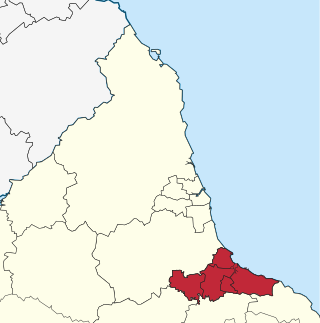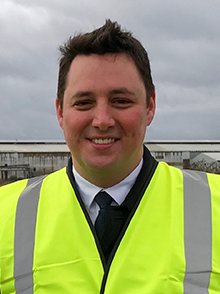Related Research Articles

North Yorkshire is a ceremonial county in the Yorkshire and the Humber and North East regions of England. It borders County Durham to the north, the North Sea to the east, the East Riding of Yorkshire to the south-east, South Yorkshire to the south, West Yorkshire to the south-west, and Cumbria and Lancashire to the west. Northallerton is the county town. The county was historically part of Yorkshire.

Stockton-on-Tees is a market town in County Durham, England, with a population of 84,815 at the 2021 UK census. It gives its name to and is the largest settlement in the wider Borough of Stockton-on-Tees. It is part of Teesside and the Tees Valley, on the northern bank of the River Tees.

Middlesbrough is a town in North Yorkshire, England. The town lies near the mouth of the River Tees, forming part of the Teesside built-up area, and is located north of the North York Moors National Park. The wider Borough of Middlesbrough had a population 148,215 at the 2021 UK census. Middlesbrough is the largest town of the wider urban Tees Valley area, which had a population of 678,400 in 2021.

Redcar and Cleveland is a local government district with borough status in the ceremonial county of North Yorkshire, England. Its council has been a unitary authority since 1996, being a district council which also performs the functions of a county council.

Redcar is a seaside town on the Yorkshire Coast in the Redcar and Cleveland unitary authority in the ceremonial county of North Yorkshire, England. It is located 7 miles (11 km) east of Middlesbrough.

Teesside is a built-up area around the River Tees in North East England, split between County Durham and North Yorkshire. The area contains the towns of Middlesbrough, Stockton-on-Tees, Billingham, Redcar, Thornaby-on-Tees, and Ingleby Barwick. Teesside's economy was once dominated by heavy manufacturing until deindustrialisation in the latter half of the 20th century. Chemical production continues to contribute significantly to Teesside's economy.

Thornaby-on-Tees, commonly referred to as Thornaby, is a town and civil parish in North Yorkshire, England. Situated on the south bank of the River Tees, approximately 3 miles (4.8 km) west of Middlesbrough and roughly 3 miles (4.8 km) south of Stockton, it forms part of the Teesside built-up area. It had a population of 24,741 at the 2011 census. The town is home to Queen's Campus, Durham University.

BBC Radio Tees is the BBC's local radio station serving the Tees Valley and the northern parts of North Yorkshire, including Whitby. It broadcasts on FM, DAB, digital TV and via BBC Sounds from studios on Newport Road in Middlesbrough.

The Borough of Stockton-on-Tees is a local government district with borough status which straddles the ceremonial counties of County Durham and North Yorkshire, England. Since 1996 its council has been a unitary authority, being a district council which also performs the functions of a county council. The borough had a population of 196,600 in 2021.

Billingham is a town and civil parish in County Durham, England. The town is on the north side of the River Tees and is governed as part of the Borough of Stockton-on-Tees unitary authority. It had a population of 35,165 in the 2011 Census.

Tees Valley is a combined authority area in Northern England, around the lower River Tees. The area is not a geographical valley; the local term for the valley is Teesdale. The combined authority covers five council areas: Darlington, Hartlepool, Middlesbrough, Redcar and Cleveland and Stockton-on-Tees.

Cleveland Fire Brigade is the statutory fire and rescue service covering the boroughs of Hartlepool, Middlesbrough, Redcar and Cleveland & Stockton-on-Tees in the North East of England. The name originates from the former county of Cleveland which was abolished in 1996. The brigade’s area is split between the ceremonial counties of County Durham and North Yorkshire.

Cleveland was a non-metropolitan county located in North East England which existed between 1974 and 1996. Cleveland was a two-tier county and had four boroughs: Hartlepool, Stockton-on-Tees, Middlesbrough and Langbaurgh-on-Tees. The county town was Middlesbrough, where Cleveland County Council met. The county was named after the historic area of Cleveland, Yorkshire. Its area is now split between the counties of North Yorkshire and County Durham.

The County Borough of Teesside was a county borough in the north-east of England, which existed for just six years. It was created in 1968 to cover the Teesside conurbation which had grown up around the various port and industrial towns near the mouth of the River Tees. The council was based in Middlesbrough, the area's largest town. The county borough was abolished in 1974 on the creation of the new county of Cleveland, which covered a larger area, with the county borough's territory being split between three of the four districts created in the new county. In 1971 it had a population of 396,233.
Eston Nab is a rocky outcrop hill in the town of Eston, Redcar and Cleveland, North Yorkshire, England.

Redcar and Cleveland Borough Council is the local authority for Redcar and Cleveland, a local government district with borough status in the ceremonial county of North Yorkshire, England. Since 1996 the council has been a unitary authority, being a district council which also performs the functions of a county council. The council was created in 1974 as Langbaurgh Borough Council and was a lower-tier authority until 1996 when it was renamed and became a unitary authority, taking over county-level functions from the abolished Cleveland County Council.

The Tees Valley Combined Authority (TVCA) is the combined authority for the Tees Valley urban area in England consisting of the following five unitary authorities: Darlington, Hartlepool, Middlesbrough, Redcar and Cleveland, and Stockton-on-Tees, covering a population of approximately 700,000 people. It was proposed that a combined authority be established by statutory instrument under the Local Democracy, Economic Development and Construction Act 2009. It is a strategic authority with powers over transport, economic development and regeneration including the flagship Teesside Freeport.

Ben Houchen, Baron Houchen of High Leven, is a British Conservative politician and life peer. He has been Tees Valley Mayor since 2017, winning the inaugural mayoral election in the combined authority. Houchen was re-elected in 2021 and won a third term in 2024.
The non-metropolitan county of Cleveland was created under the Local Government Act 1972, which came into effect on 1 April 1974, comprising the urban areas around the mouth of the River Tees, previously parts of the administrative counties of Durham and North Riding of Yorkshire. Although it was abolished in 1996, the four unitary authorities which succeeded it have been considered together for the purposes of reviewing parliamentary boundaries. The area has returned 6 MPs to the UK Parliament since 1983.
Demography of the Tees Valley or Teesside metropolitan area of England is recorded with differing definitions. The area's fragmented data into different area definintions every other census after 1971 has meant a lack of clear lineal correlation analysis and anachronistic data.
References
- ↑ Rachel (13 June 2016). "Teesside Archives". www.middlesbrough.gov.uk.
- ↑ teessidearchives (18 January 2022). "The History of Teesside Archives". Teesside Archives. Retrieved 27 June 2024.